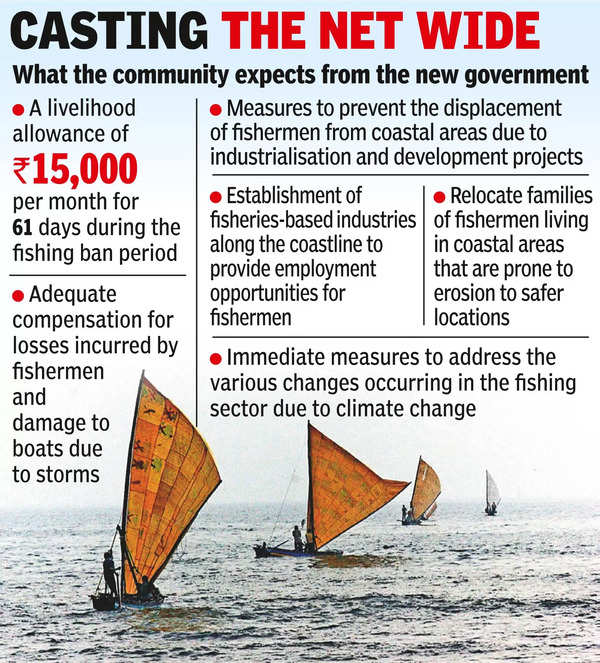Amid the ongoing electioneering process, the longstanding issues of fishermen community of Andhra Pradesh have once again come to the forefront.
A significant number of fishermen from the north coastal Andhra Pradesh, including from Visakhapantam, Vizianagaram, and Srikakulam districts, are migrating to states like Gujarat, Kerala, Maharashtra, and Tamil Nadu.

The fishermen community is requesting the govt to establish mini fishing jetties within a 50-kilometer radius. To track migrant workers, the labour department and the fisheries department can jointly establish a registration centre for migrant workers. The youth from the fishermen community have been gradually moving away from fishing activities due to declining catch and the fishing becoming nonremunerative.
Speaking to TOI, National Fisherfolk Forum general secretary Arjili Dasu said that the proposed fishing harbours and fish landing centres in Andhra Pradesh are still under construction. “These centres should provide modern boats, nets, engines, fishing gear, ice boxes, safety and navigation equipment to fishermen to protect themselves against sea hazards. The govt should also extend subsidies for nets, hooks, lines, ice boxes, and fishing equipment at 90% of the cost. In addition, a 50% subsidy for diesel should be provided. We request 10,000 litres of diesel per month for motorised boats and 3,000 litres per month for non-motorised boats,” said Dasu.
“To effectively implement the aforementioned initiatives, an Integrated Marine, Coastal Traditional Fishers Development Authority (IMCTFDA) should be established. This authority should review and harmonise existing government policies, laws, notifications, orders, rules, guidelines, and reports by various statutory committees to ensure their alignment with the interests of traditional marine and coastal fisherfolk. We urge the governments to repeal policies that are detrimental to the welfare of traditional fisherfolk, such as the marine mining policy. We also call for the enactment of the traditional marine coastal fisherfolk (protection of rights) Act, 2009 (draft),” added Arjili Dasu.
“Currently, scheduled castes and scheduled tribes enjoy reservation benefits in education, employment, and various government schemes. However, traditional marine and coastal fisherfolk are excluded from these opportunities due to the absence of similar provisions. To address this disparity and ensure equitable access, extending reservation to these marginalized communities is imperative. The govt should consider classifying traditional marine and coastal fisherfolk under the most backward class (MBC) category. This would provide them with access to educational institutions, government jobs, and other schemes at both central and state levels,” added Dasu.
YSRCP Visakhapatnam district president Kola Guruvulu, who also belongs to the fishermen community, said that the YSRCP govt has initiated a range of measures for the overall development of the fishermen community in Andhra Pradesh.
“The YSRCP government is developing four ports, 10 fishing harbours, six fish landing centres, and an aqua university, which would ultimately benefit the fishermen community. Port-led development has the potential to make the community flourish on all fronts,” said Guruvulu.